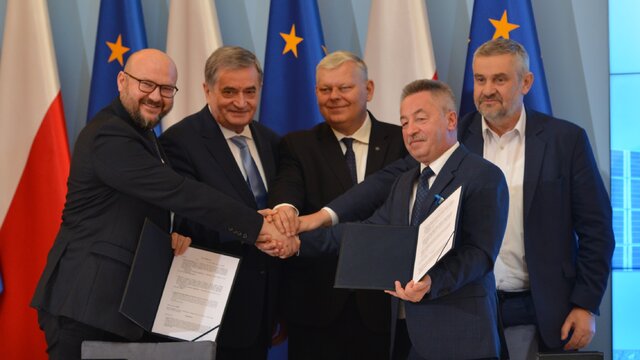ENEA Group and the National Support Centre for Agriculture start cooperation on solar power development in Poland
ENEA and its subsidiary ENEA Wytwarzanie signed a tripartite letter of intent with the National Support Centre for Agriculture to start a cooperation on the development of large-size solar photovoltaic (PV) farms on agricultural land. This initiative will contribute to achieving an overall rise in the share of renewable energy sources (RES) in Poland’s energy mix and promoting renewable energy generation in rural areas. Ultimately, the large-size solar farms developed under the project will help achieve the overarching objective of EU Energy and Climate Package, i.e. reduction of CO2 emissions.
The intention of the signatories of the letter is to establish a Special Purpose Entity (SPE), whose objects will be to develop RES generation projects, such as large-size solar farms, on agricultural land owned by the National Support Centre for Agriculture. The potential basis for future development of solar plants will be the land from the so-called Agricultural Property Stock of the State Treasury, in particular one having low agricultural use value. In the first line, these will be plots designated in spatial development plans and studies of conditions and directions of spatial development of municipalities as land for RES investment.
The letter of intent on future cooperation was signed on 11th October in the presence of: Marek Suski, Secretary of State in the Chancellery of the Prime Minister, Tadeusz Skobel, Undersecretary of State and Deputy Minister of Energy, and Jan Krzysztof Ardanowski, Minister of Agriculture and Rural Development.
– We continuously strive to maximally leverage any opportunities and potential we have to develop renewable energy generation in Poland in line with the objectives of the National Plan for Energy and Climate. Therefore I am pleased that the National Support Centre for Agriculture, a specialised government agency, and ENEA, a company with partial state treasury shareholding, are jointly building an effective model of cooperation aimed at achieving such ambitious goals – said Marek Suski, Secretary of State in the Chancellery of the Prime Minister, Head of the Prime Minister’s Political Cabinet.
– Rural Poland is actively joining in the green revolution, providing the energy industry with its unused agricultural land for development of large-size solar farms. As a ministry, we are natural champions for development of RES installations in rural areas that we believe can greatly benefit from clean energy and stable energy supplies as this is bound to improve the competitiveness of agricultural products and services produced there – stressed Jan Krzysztof Ardanowski, Minister of Agriculture and Rural Development.
– The general objective of developing renewable energy generation is to gain the momentum for changing the country’s energy mix. And photovoltaic installations are our main area of focus as they enjoy the largest public support. As a result of our concerted efforts, PV generation is now growing, in particular in two segments: large-size solar farms and microinstallations. As for the latter, an important role is played by prosumers. For them, we have prepared and implemented “My Energy” Programme, under which we offer co-financing for up to 50% of the PV installation’s value, but not more than PLN 5,000. Around 200,000 prosumers can potentially take advantage of the Programme, for which we have budgeted PLN 1 billion in total – said Tadeusz Skobel, Undersecretary of State and Deputy Minister of Energy.
The cooperation between ENEA Group and the National Support Centre for Agriculture fits into the objectives of the draft Poland’s Energy Policy until 2040 (PEP2040), which envisages the development of renewable energy generation for the purposes of diversification of the country’s energy mix and reduction of the energy sector’s overall carbon footprint. The solar power generation market has been dynamically growing for several years now – last year, a record-high increase in new PV installations was posted. And solar power installations along with offshore wind farms are likely to dominate Polish RES generation in the coming years.
– The agri-food industry certainly has a huge potential for clean energy development. The cooperation in this area is nothing but an implementation of the objectives set by the Polish government and the Ministry of Agriculture and Rural Development in order to stimulate renewable energy generation and promote RES use for production of agri-food products, which are one of Poland’s key exports – commented Grzegorz Pięta, Director General of the National Support Centre for Agriculture.
– At ENEA, we are planning to increase our share in the dynamically growing PV generation market. Our joint project with the National Support Centre for Agriculture will strengthen the country’s energy security as solar power will help meet the growing demand for energy in the summer months, adding to the generation from conventional sources. RES investment is part of our strategy for a transition of ENEA Group’s energy mix towards lower emissions intensity – added Jarosław Ołowski, Vice-President of the Management Board for Financial Affairs, ENEA S.A.
ENEA Group continues to implement green energy projects, steadily increasing its RES generation. In the first half of 2019, the growth of renewable energy generation exceeded 12%. The Group places great emphasis on designing an economically viable transition of its generation capacity towards renewable energy sources, thus changing the Group’s energy mix. The new, updated ENEA Group’s Development Strategy will be released till the end of this year.
Recently, ENEA Group has started implementing other similar projects. On the land owned by ENEA Group company LW Bogdanka, the operator of Bogdanka mine, solar PV farms with the total capacity of up to 30 MW are planned to be built. All the energy generated in the new installations will be used by LW Bogdanka for the purposes of the mine and its production processes. Another new RES project will be implemented in Piła, where a new, low-emission cogeneration heat source working in cooperation with a RES installation will be developed. Once completed, it will help MEC Piła – another ENEA Group company – reduce its conventional energy consumption and lower its CO2 emissions. A project that has already been put into operation is the Green Unit at Połaniec Power Plant. One of the world’s largest circulating fluidized bed (CFB) boilers with the capacity of 225 MW, the Green Unit is fuelled by biomass (wood chips and agricultural waste) sourced from local producers.
Share on:











